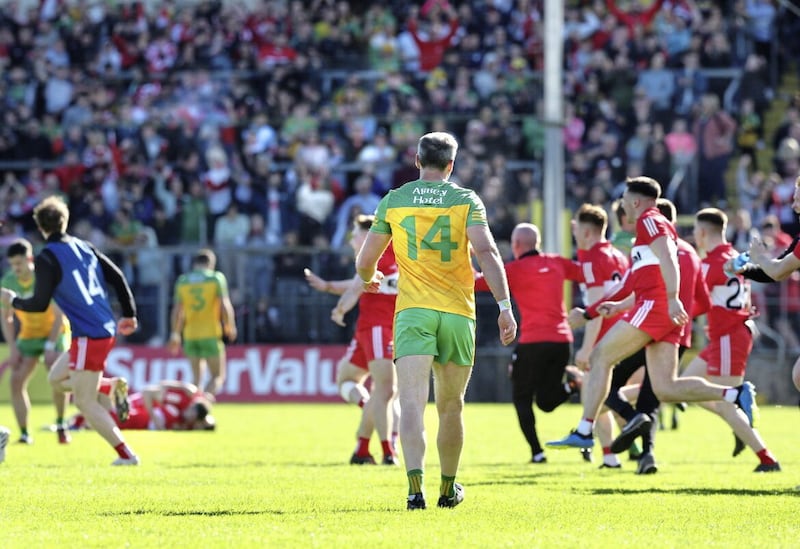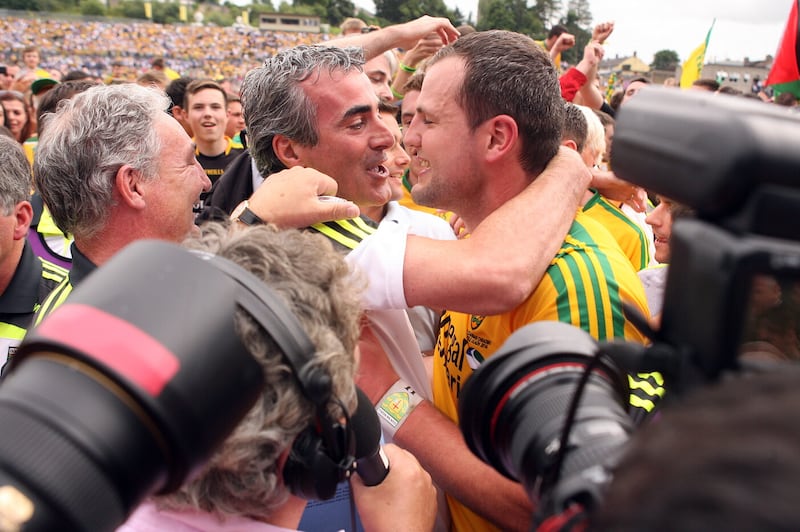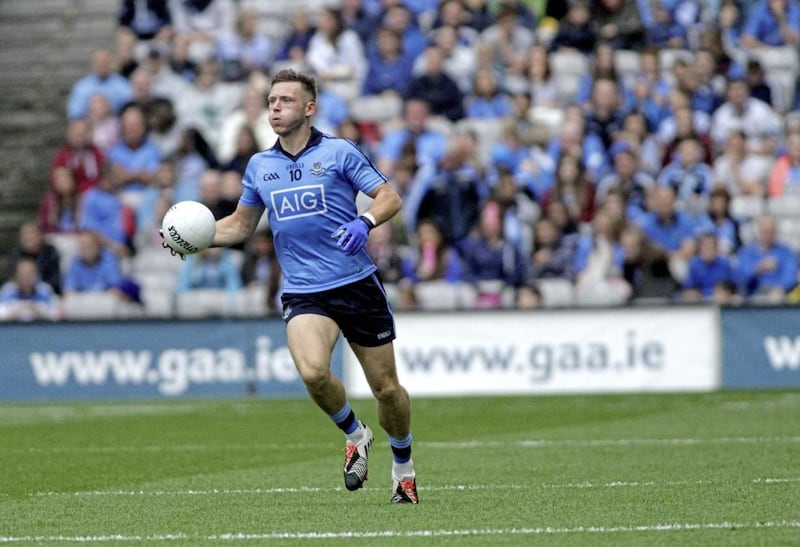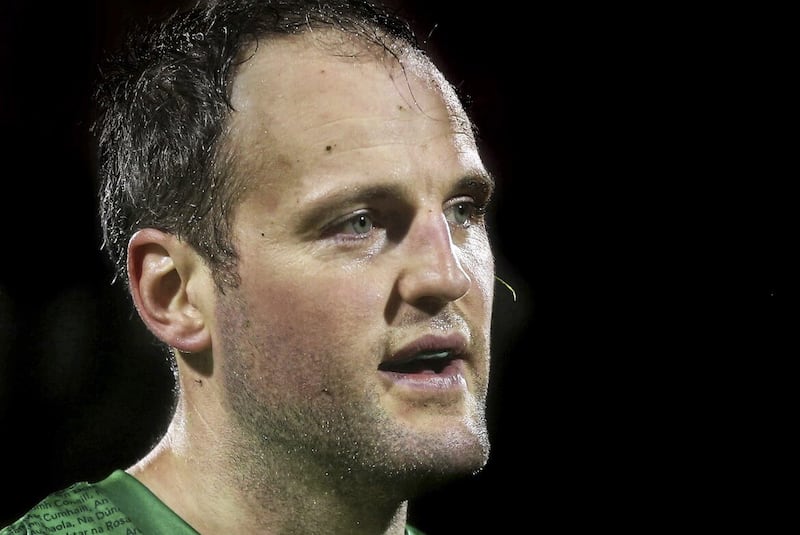“To me it comes back to the – we’re getting deep now – but the reason why. To me, the Tuesday night in Convoy in November was a chance to put Donegal on the map. I was fortunate enough that I had that why created in my head or in my gut or my heart very, very early. I don’t know if it was done by method or it was just something that was there. Them experiences of Clones in ‘98, of going to Croke Park for those Ulster finals with Armagh, the experiences of Tyrone in Ulster semi-finals in 2007, seeing all those teams beaten, the feelings created in a very strong way. That Tuesday night in November was a chance to do something about it. A Monday morning here in the gym in Letterkenny is a chance to do something about it. That’s the bit. Every day, you were maybe lifting the bar and you’re asking yourself are you lifting the bar more than the Tyrone player or the Armagh player? What other way is there? You’re just ticking a box then in doing it. You’re just a lifestyle footballer then that enjoys going to the gym. Or are you actually a footballer that is wanting to do something?”
___________________________________________________
THE skin that disguises Michael Murphy’s inner dragon is as thick as a cow’s hide.
What we see on the outside is this mild-mannered, modest, almost quintessentially reverent Donegal man.
Merely scratching at it is a gateway to nowhere. It’s not so much peeling back easy-going layers as lifting heavy carpet and finding more underneath.
But beneath it, real depth exists. An unrelenting warrior. We know that.
As the words at the top of the page came tumbling from him in the corner of the Mount Errigal Hotel foyer, he begins to almost physically stir in the chair.
The pace of his speech quickens, control over each Glenswilly syllable relinquished by just enough of a fraction to allow you see what really made him the force that he...
Was.
You just never thought the past tense would apply to him.
A man that could have passed for 30 when he was 18, nothing about him ever seemed to change.
Every time Donegal sent a team out, he was their number 14. That was just the way it was.

The carousel spun full pelt, twelve months of the year for sixteen years. Then Brendan Rogers jammed a pound coin in it.
He’d gone around so fast for so long that when it stopped, you wondered how dizzy he’d be.
Men that gave far less of themselves struggled far more with stepping off.
In some ways he’d been subconsciously positioning himself for an exit.
He started taking Glenswilly minors in 2022, eating up his Mondays and Fridays. When the U17s were finished last year, Donegal ran an U18 tournament. Then the U21s. He was in the thick of all three, taking him right up until the first week of December.
It’s almost a full 18 months now since his retirement from playing was announced and still people look at the whole idea through a prism of suspicion, as if they wouldn’t be at all surprised with him stepping off the Donegal team bus in Celtic Park with his boots in hand.
His commitment to retirement is as resolute as his commitment to playing was.
For the first while, people would ask if he was sure and then glare at him as if nobody else had asked and a lightbulb was about to go on.
Sixteen omnipotent years felt like one long, slow blink for someone that his own people thought would just last forever.
He’ll be 35 in August.
That didn’t stop Jim McGuinness from trying.
“I do speak to him all of the time and had him half-tortured there for a while,” the Donegal manager said in December, finally admitting defeat.
So how tortured was half-tortured?
“Ah we had numerous good oul chats.”
Were you ever close?
“Ahhh… naw.”
Even halfway there?
“There were odd days I’d position myself in a way to say ‘right, you’re back’ but all of a sudden, by the afternoon, knowing what’s required and what the new setup was going to have to give, I just couldn’t give the energy. I could probably be there and tick the box, but you need to colour in the box.”
Even now the quizzing feels unfair, as if he’s been made continually justify a perfectly natural end.
Donegal have won ten Ulster titles and two All-Irelands in their history.
Brian McEniff was either player-manager or outright boss for the first five Ulsters and in 1992.
Michael Murphy was captain for the other five, and in 2012.
Their unmatched imprints on Donegal football will be permanent.
Brendan Devenney once famously said that Murphy wasn’t just the best player Donegal had ever had, but that if you cut him in half he’d be number one and two.
The storm clouds gathered so fulsomely and so thick above Donegal football last year that the rain covered every inch, leaving no room to actually see the fullness of his absence yet.

The league is the league. They’ve won Division Two, beaten Armagh in the final while down a host of men, but it’s only if there are any bees out yet to fly near a window on Saturday that we’ll begin to know for sure.
Others resist his closing of the chapter but he sits heavy on the next blank page. It’s just about what he’ll put there now.
Punditry maybe wouldn’t have been the first thing that came to people’s minds but he’s growing into his skin on that front too, the experiences with BBC and GAAGO starting to accumulate and show.
Him managing Donegal at some point in the future has long felt like an inevitability. As the years ticked on in his playing career the question began to arise. He said he’d like to learn his trade first, but never really dissuaded anyone from the idea that somewhere down the line he might like a shot at it.
But.
“Aye, listen, when I was playing I would have always thought aye I always had an interest in management, just from a love of playing, a love of the game, a love of Donegal, I would have always thought yep, I’d love to try it.
“I’d have always done a bit with the club and a bit with the college, still with the club minors again in recent years.
“Just not as sure now up the levels. Seven, eight years ago I’d have said yep, definitely ambition. Now…”
Why?
Murphy pauses.
“I would have said then I’d have went straight into something at some level. But time and energy, again, what’s required. I keep coming back to this word ‘energy’. When you meet and speak to other managers around the place and you’re chatting to them about what’s required, and I’d be fearful of where to stop. Where does the day stop? There always has to be something to do.
“It would have to be at the right time where you’re able to give it socks for three, four years. Them teams and groups of players deserve that. I’ve been on the receiving end of that from managers and to me, that’s the bottom rung of what’s required. I would need to be in a place to give that. I’d hate to be in a place to give it where you’re giving it but you know that there’s another element that’s required or needed.
“I always thought I had a good idea of football, this is the way it has to be done, this is the way we play it, this is the way we go around it. And probably the last five years in particular, f***ing learning new things constantly. And because you learn something new, you start realising and nearly doubting everything as regards ‘I had this solid belief this is how it is, now I’ve learned something new, there has to be another ten things out there to learn’.
“But maybe you never get to there. Maybe you’re always a work in progress, I dunno.”
An ardent Liverpool fan, Murphy absorbed the words of Jurgen Klopp’s interview that announced his decision to leave the club at the end of this season.
Glaring into the camera, the simplicity of Klopp’s message gave Murphy the words he’d been searching for to describe his own feelings on playing and management and where it all fits right now.
“I’m tired,” the German simply said that afternoon, his shoulders depressing as though relieved to say it out loud.
“It’s funny when I heard that day and listening to him, it just shows the magic of him and the daftness of me, he articulated it in two sentences what I’ve been trying to articulate for… I’m not in one way comparing myself to Jurgen Klopp by any stretch, but I understood what he meant by the energy piece. He was able to say it in two sentences. That’s exactly the way it was feeling with myself.”
Being able to give everything of himself is the key ingredient that Murphy just doesn’t have in his cupboard at this very moment.
But a bit of time, you suspect, will fill him back up.
___________________________________________________
ON the first day of November last, he met Annie Keeney at the head of the aisle in Florence.
Just the two of them, a couple of friends and both sets of parents.
“There was no fuss, so I enjoyed it. Just the morning of it, rocked up and got on with it.
“Priests and everyone out there didn’t have a clue of anything or who or what, y’know that kinda way?”
Anything or who or what, meaning the pseudo-celebrity status he carries at home, albeit uncomfortably.
But it’s impossible to be oblivious to the realities.
He and Annie built in Glenswilly, just down the road from his home place, and moved in a few years ago.
They had a party back home with everyone two weeks ago, and the day after he came off the bench to kick a 62nd minute equaliser for Glenswilly in a league game with St Michael’s.
No fuss.
___________________________________________________
WHEN Michael Murphy was born, his hip was out of place.
He was one of three sons of Mayo fathers on the Donegal team that won the All-Ireland in 2012, along with Paul Durcan and Marty O’Reilly.
Before the 2012 All-Ireland final, journalist Alan Foley got the three fathers together and pushed record. The stories came flooding out.
“It meant unless it was operated on before he turned three, he would have a permanent limp,” Mick Murphy explained.
Donegal lost the 1990 All-Ireland semi-final to Meath and the following day, they took Michael to the Mater Hospital. He was in a plaster for months, traipsing to Dublin regularly for check-ups.
From the moment he outgrew the primary school notion of joining the Army – “that was in my Action Man days, I think” – all he ever wanted to do was wear the green and gold.
As a football-obsessed young boy, he tormented his father to take him to Croke Park as a child.
Eventually, when they were down visiting relatives on his mother’s side in Meath, they took a spin on down.
The receptionist politely shook her head but as the story goes, they met Micheal Ó Muircheartaigh on the way out and he took them pitchside.
There’s fortune, good and bad, in every footballer’s story.
Murphy has always credited so much of his grounding in his father’s involvement with Donegal development squads, particularly the team that contained Karl Lacey, Colm McFadden, Christy Toye and Eamon McGee.
Living with Paul Flynn and Aidan Walsh when they were at DCU, the three of them future Allstars.

That never really having had a county star to look up to in Glenswilly, he came along a few years behind Neil Gallagher, who would call to his door and collect him for training, walk into the changing room with him, sit beside him, talk to him.
But so much of what drove him was the formative hurt of the bad days.
When Geoffrey McGonagle nudged Noel McGinley out of the way and fed Joe Brolly to snatch the Ulster title away in 1998, Murphy was sat right there on the 21-yard line, dressed head-to-toe in his full kit.
Feeling every stake Armagh drove through their hearts in Clones and Croke Park, the trudge of every step back to the car.
“It’s one thing you look back on as a supporter is the devastation it caused, going back to the car and that shared experience on the way back with everyone, the hurt and the devastation it caused. Those experiences always stayed with me.
“They all stoked something in me that ‘til this day, it’s not that you’re trying to beat this team on this Sunday, you’re thinking of things they inflicted on us down the years.
“The quietness in the car driving back down the road, the Donegal supporters you walked back out the road with, just another day of that.
“For me, I was lucky enough I was able to play football to do something about it.”
For 15 years, he did everything he could about it.
Where he walked, Donegal football followed.
In some ways, two of the more non-descript afternoons sum him up.
Three years ago, his hamstring was hanging together in the lead-in to the Ulster Championship.
They were going to beat Down with or without him, but he never saw it like that. If he could play at all, then he would.
Donegal won by 16 points. He lasted half an hour before the hamstring tightened up and he had to come off.
Three weeks later, they were in deep trouble against Derry. Strapped to the gills, he came off the bench when they were three points down. Hardly fit to run, the attention he attracted opened gaps for others. He hardly touched the ball but Donegal wouldn’t have won without him.
The only day that ever existed to Michael Murphy was today. There was no tomorrow.
“The only time we fell out was over injuries; he tried to play through them and insisted that he was all right. It was almost as if he had this idea that as captain, he wasn’t allowed to be injured,” Jim McGuinness said in his book, Until Victory Always.
Anything less than being absolutely desperate to play for Donegal would have felt like an internal betrayal of the young boy walking back to the car in ‘98 with tears stinging his eyes.
When his former team-mates went back to get gazumped Down in Newry last summer, he was stood powerless on the sideline, microphone in hand, wondering what words he could reach for that would find the sweet spot between hurt and guilt and objectivity.
“There’s no doubt there’s a twinge of that feeling [guilt] within it, 100 per cent. You’re so much in it for so long.
“But there would have been a bigger guilt from being there and doing things half-heartedly myself. I don’t know what way it would have played out if I had stayed involved.
“When I did that and the decision was made and you seen the way things turned out last year, yeah, there’s always a bit of f***ing guilt.”
But beneath that, deeper down in him, there’s the sense that he did the right thing getting out when he felt he couldn’t colour in the box any more.
A lifestyle footballer, or a footballer that wanted to do something.
Michael Murphy was only ever one of those things and couldn’t have coped with being the other.
Was.
It still takes getting used to.



